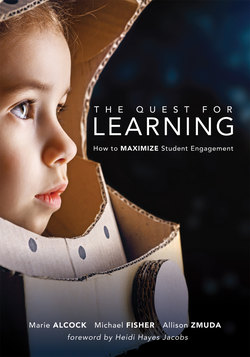Читать книгу Quest for Learning - Marie Alcock - Страница 8
ОглавлениеForeword
By Heidi Hayes Jacobs
Fusion creates new energy, and the integrative force of Alcock, Fisher, and Zmuda in The Quest for Learning ignites innovative possibilities for learners and their teachers. But their fusion does more than that. It genuinely shifts pedagogy into fresh territory with regard to approach, time, and motivation. As educators at every level of learning ask, “How can we engage our right-now learners in meaningful queries?” this trio of authors takes a deep dive into this question with creative and powerful results.
In response to that question, the authors compel us to reconsider more rigid views of instructional models and curriculum planning and see the potential for hooking our learners on questing threads both spontaneously and over time. Their carefully crafted tenets of engagement serve as a vibrant questing platform that can drive our professional choices and actions.
I am particularly struck by how Alcock, Fisher, and Zmuda build on these tenets by tackling the challenge of naturally merging three critical contemporary arenas into practice: gaming, networking, and question design. These arenas have perplexed teachers and school leaders who grapple with modern learning experiences. Gaming is a source of fascination and considerable discussion, especially among educators who are involved in game play, but it has remained an outlier in everyday school life and practice. In this book, readers not only explore and compare an array of game types but gain direct connections between gaming and content areas and skills.
Networking is part of everyday life for most students and teachers, yet it conspicuously gets neglected in curriculum planning. Here, the authors open up specific strategies for making discerning networking choices in regard to social-networking platforms, community organizations, in-school networks, and peer relationships.
Also, while raising questions for investigation is not new to educators because it is at the heart of teaching and learning, the authors argue for a more nuanced view of questioning. They propose teachers present questions that provoke student ownership of learning pathways. Respecting each student as unique in a specific place and time, educators must be observant and responsive with the formation of four types of questions that encourage meaningful investigations. In short, the authors declare that because we have contemporary learners, we need to bring those learners to relevant, worthy inquiries and experiences; active, intentional cycles of expertise; and social, collaborative opportunities.
The authors creatively explore examples of gaming, networking, and inquiry. They pack the book with clear visuals showing the relationship between the three arenas, strategies for integrating them, and resources for further exploration.
While reading The Quest for Learning, I found it striking how it asks us to think differently about our interactions with students—not only in moment-to-moment interactions but during long-term planning as well. We do not direct learners; we teach them to direct themselves. Questing is a mindset for engagement. Rather than a rigid step-by-step planning model, genuine design thinking is afoot here. Alcock, Fisher, and Zmuda provoke catalytic, genuine rethinking of overly planned, rigid types of inquiry, which contradict the nature of spontaneity. It is not that plans do not matter; they do. But we often miss the myriad of opportunities to actively seek questions, deepen curiosity, and determine which questions merit longer-term investigation.
The Quest for Learning cultivates the joys of an epiphany-making environment. The authors walk us through golden opportunities to pick up on student interests and convert them into threads for inquiry. This book is a wake-up call to mindful listening and observation. Often, the clues we need are there—with both motivated and struggling learners.
Timely in its focus, The Quest for Learning provides direct guidance for administrators and teachers who are developing personalized learning opportunities. Nationally and internationally, school planning meetings lead to lively, often frustrating discussions about what personalized learning looks like. Is it the same as individualized instruction? Is it differentiation? Is it project-based learning? More than any book I have read before, the book in your hands details how to navigate learners through a compelling personalized learning journey. As co-creators, teachers and learners move from interest to inspiration in framing questions, researching and networking, and developing deliverables for an authentic questing experience. What is more, the authors present suggestions in the context of thoughtfully rendered pedagogy refreshed by the three tenets of engagement.
As we all are keenly aware, a new chapter opens the moment a learner walks into his or her classroom for the first time. Yet, in truth, a student encounters the possibility of a new beginning every time he or she walks into the classroom. We know the magic that shines in the eyes of a lit learner. As educators, we can be discerning and responsive guides assisting our charges make meaning and pose new queries. Contemporary students require fresh approaches matching who they are and the time in which they live. The Quest for Learning raises our awareness and fuses modern learning tools to open up options. The word quest in the book title aptly reflects our never-ending search as educators to develop exceptional thinkers and human beings.
On a personal note, it has been my great personal and professional pleasure to work with Marie, Mike, and Allison over several decades in a range of settings. I knew each of them separately before they met one another, and I admire their individual expertise. It is moving to have witnessed their interactions over the years. Their brilliance, passion, and ingenuity are evident in this book. There is no doubt that their future contributions will be electric.
